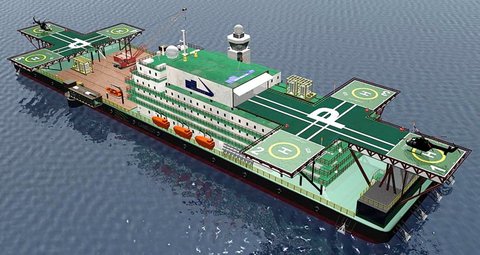 Courtesy of BlueseedMax Marty: “a way to connect Silicon Valley with the amazing founders and entrepreneurs out around the world.”
Courtesy of BlueseedMax Marty: “a way to connect Silicon Valley with the amazing founders and entrepreneurs out around the world.”
Start
The adventure of new ventures.
Technology gurus have long lamented how hard it is for foreign talent to secure American visas and create start-ups here. As Congress spins its wheels with endless debate over immigration, an ambitious venture based in Sunnyvale, Calif., is trying to chart a more productive course aboard a 600-foot boat, or possibly a barge.
That’s the idea behind Blueseed, which aims to create a visa-free, floating incubator for international entrepreneurs off the California coast near Silicon Valley.
Blueseed’s co-founders, Max Marty, 27, and Dario Mutabdzija, 31, envision a seaworthy, 1,000-passenger hothouse for entrepreneurs from around the world, moored 12 nautical miles offshore — just outside California’s territorial waters — with enough appealing amenities to make it a “Googleplex of the Sea.” Passengers could take a day trip by ferry to the mainland on temporary tourist or business visas, returning to sleep in cabins that would rent for $1,200 to $3,000 a month.
“Blueseed is a way to connect Silicon Valley with the amazing founders and entrepreneurs out around the world,” Mr. Marty said. “Existing visa policies were designed for a different era. The nature of business has changed, and what’s lacking now is an avenue for people to be able to come in and create great companies.”
Peter Thiel, a co-founder of PayPal and prominent venture capitalist, signed on recently as an investor in Blueseed. The company is currently seeking additional investors to raise a total of $500,000 in seed capital.
“Tech innovation drives economic growth, and we need more of both,” Mr. Thiel elaborated in a written statement for this blog. “Many innovative people have a really hard time getting visas, and Blueseed will help bring more innovation to California with a solution that is itself as innovative as it is clever.”
Mr. Thiel, a staunch libertarian, made a splash in August by contributing $1.25 million to the Seasteading Institute, a Sunnyvale nonprofit founded by Patri Friedman (grandson of Milton Friedman, the economist) that explores the creation of autonomous ocean colonies. He declined through a spokesman to say how much he had invested in Blueseed.
Mr. Marty and Mr. Mutabdzija first met as directors of business and legal strategy at the Seasteading Institute. They estimate that their current project could end up costing $15 million, if they charter a vessel, to $40 million, if they buy one. They hope — perhaps optimistically — to have it afloat in 2013.
Past efforts to ease immigration restrictions for entrepreneurs have seemed less the stuff of science fiction. In February 2010, Senators John Kerry and Richard Lugar introduced the first version of the Start-Up Visa Act, which would create a path to citizenship for immigrant entrepreneurs who meet benchmarks for raising capital and creating jobs. Though the bill has since been reintroduced, it hasn’t made any progress.
Champions of both Blueseed and the Start-Up Visa Act are quick to point out that immigrants were founders of more than half of Silicon Valley’s start-ups between 1995 and 2005, according to Duke University research. They add that, without strivers from abroad like Sergey Brin and Vinod Khosla, companies like Google and Sun Microsystems would not be part of America’s tech ecosystem. (Mr. Marty’s parents are both Cuban immigrants and entrepreneurs; Mr. Mutabdzija was born in Sarajevo.)
For Blueseed’s founders, the first hurdle will be convincing potential investors that their vision is not as far-fetched as it might seem. They believe it is a matter of cobbling together best practices from well-explored, less exotic territory — maritime engineering, international law — to create great work-live-play spaces for tech dreamers. Foreign entrepreneurs, they say, are hoping for the chance to marinate in Silicon Valley, and more than 60 of them have expressed interest in the project through an online survey.
“I and many others are suffering over the situation that we cannot go to America to be around these people,” said Nico Schweinzer, a serial entrepreneur reached by Skype in Graz, Austria, where he created JobGuru, an employment site, and is building Oracly, a service that lets shoppers scan product bar codes with smartphones to receive short reviews. “For me, it’s not so much about the investors, but more about being where you can exchange ideas and get skilled people for your projects.
“Blueseed is a fantastic idea,” he added. “You could go there and be very close to the mecca of the tech scene.”
What do you think?
Article source: http://feeds.nytimes.com/click.phdo?i=7d83d1a0965f36a5a9e2bfe707bf13c9